As more leading operators and specialists look to capture market share in the food-to-go market, what approach should they take and where do the possible pitfalls lie?
With time-pressed, cost-conscious shoppers shifting to eating little and often, it’s little surprise that the food-to-go market is booming.
Valued at £16.1bn in 2016, research firm IGD predicts the segment will hit £21.7bn by 2021, offering retail bakers – a natural outlet for food-to-go – big growth opportunities.
Many of the UK’s largest suppliers have set out their stall to grow food-to-go. Greencore Group says the category accounted for 9.1% like-for-like sales growth for the quarter ending 30 December 2016, as it reaped the benefits of its Northampton site expansion. Samworth Brothers launched its Deli Bite brand last year to exploit the market, and Greggs has refocused its strategy to transform from traditional bakery to an on-the-go retailer. Ninety-two percent of its estate has adopted a food-on-the-go format and a further 200 shops are pegged for refurbishment over the coming year.
In its full-year results for 2016, Greggs said breakfast continues to be the fastest-growing part of its trading day, linked largely to customers travelling.
Hertfordshire-based bakery Days of Ashwell points out that seven of its 11 shops are supporting a brisk breakfast trade.
“The boom is in the breakfast market,” says bakery manager Clive Draper. “For some bigger shops, we make products in the main bakery and send them frozen so they can bake off earlier.”
Breakfast is a key focus, agrees James Simpson, managing director of on-the-go food supplier FSC Group. But it can be difficult to get right, he warns: “Availability of hot food at breakfast is very important, with a tight window, and is difficult to manage from a waste perspective.”
Most FSC customers, which include Shell UK (Deli2go), SSP Group, Thorntons Cafés and John Lewis, use on-site baking facilities unless space is limited. Some of these customers take advantage of its pre-made fillings, which are prepared on a scoop for super-fast preparation with freshly baked bread. This has advantages including waste control, quality/portion control, speed of service and freshness, says Simpson. “While the cost of delivering the pre-made ingredients is higher, the overall margin – once waste and labour are taken into account – is maintained and the product offer is superior,” he adds.
Days of Ashwell cooks its own sausages – from meat butchered locally – in its central bakery and distributes them to its shops, many of which also cook bacon on-site. Breakfast deals, such as a bacon turnover with a coffee for £1.99, stoke trade, but Draper says the bakery’s focus on quality ingredients and efficient service helps to differentiate its food-to-go offer.
Buying good raw materials is crucial, he says: “We’re able to buy topsides of beef and our own sausages made to our spec. The price of topside makes you shudder, but you can get it back on the product.”
Hot snack and hot beverage options are important growth drivers for food-to go – and can command higher margins.
Packaging supplier Planglow says sales figures from June to December 2016 show hot snacks have risen to 11% of all grab-and-go purchases, with hot drink sales accounting for more 10.5%.
“The rise in out-of-home breakfast offerings has been instrumental in this growth,” explains Planglow marketing director Rachael Sawtell, adding that retailers could benefit from meal deal offerings that pair teas or coffees with a bacon roll or other breakfast items.
On Saturdays, Manchester-based bakery Pollen shares its space with Coffee Cranks, a coffee co-operative that roams the city with its espresso machine on a bike. Pollen sells freshly baked pastries every morning, including croissants, pains au chocolat and cinnamon buns.
Co-founder Chris Kelly says customers visit the bakery for the pastries if they are looking for on-the-go food. “They contain lots of Lescure butter and sometimes chocolate,” he says. “I don’t believe they are looking for a healthy option.”
Indeed, while the rise of health and wellness has been highlighted by the IGD as a key trend set to shape food-to-go, it’s clear the bakery sector remains “extremely polarised”, says Planglow’s Sawtell, with consumers making either very healthy choices or treat-based ones. Providers looking to venture beyond treats may wish to consider items such as protein bars, skinny muffins or flour-free traybakes for more health-conscious customers, she suggests.
Adelie Foods says its top-selling healthier lines are sandwiches, but adds that high-protein snack pots and salads are finding increasing favour.
FSC Group has seen more customer demand for its high-protein products including egg pots and chicken-on-a-stick, but also reports an increase in pastry lines with some customers.
“The share of the food-to-go sales in traditional chilled sandwiches has reduced dramatically over the past five years, but around half of this has been picked up by hot sandwiches,” says Simpson, adding that the balance has been split between salads, pastry products, sushi and other to-go lines.
While the baking industry must be responsive to increased interest in health and convenience in food-to-go, making money from these products continues to be a challenge. “The pressure to develop and deliver a wider healthy range is increasing,” says Simpson. “However, this is slow to translate into a sales level that matches the perceived demand. We are in no doubt this is a key feature of the future of food-to-go, but we’re proceeding with caution.”
Cake-to-go offer attracts new custom
Whether or not consumers are exercising the portion control extolled by Premier Foods with its ‘one for now, one for later’ twin-packs, the company’s foray into on-the-go convenience cakes has hit a sweet spot.
Volume sales of the six- strong range have reached 1.9 million units, with value sales totalling £1.5 million since the staggered launch kicked off in April 2016 (IRI December 2016). Mr Kipling Angel Slice – a top-seller in the take-home aisle – has been the most popular line in the range.
“Food on-the-go is large, growing and predicted to get bigger,” says Sarah O’Neill, head of cake on-the-go at Premier Foods. “You’re bringing in new shoppers, particularly younger people. On-the-go is a strategic priority for Premier Foods and we have a pipeline of development projects for this area.”
More NPD from Premier is on the way next month with the launch of Mr Kipling Delectable Delights (see left).
Chris Ormrod, MD of Ministry of Cake, which sells mainly to wholesalers, foodservice and catering, says the on-the-go segment is interesting, but remains the domain of the big brands. “If you’re in this space… that puts you right up against Mars, Cadbury and Nestlé. I’d counsel bakers who think they can get into this space and make money to be careful – you are stepping into a really big world to fight with and you’d better be ready.”
Food-to-go innovation
Mr Kipling Delectable Delights, Premier Foods
Launching: May 2017
Following the successful roll-out of its on-the-go convenience cakes in April 2016, Premier is expanding the range with the launch of Mr Kipling Delectable Delights. The bite-sized cakes come in packs of three cubes and will be available initially in three flavours: salted caramel, dark chocolate & raspberry, and lemon & ginger. RSP: £1.20 for a three-cube pack
Daily Bread, Adelie
Launched: March 2017
This 17-strong deli-style range includes flatbreads, bagels and a Middle Eastern-style simit bread for the lunchtime market. Ingredients are listed on a deli-style tag, which uses natural colours to convey the handmade values of the brand. The Daily Bread brand is not displayed on packaging, “allowing retailers and operators to focus on the product without brand distraction”, says Adelie. RSP: from £3.49
Vegan Green Thai and Vegan Fiery Mexican pasties, Warrens Bakery
Launched: February 2017
Cornwall-based Warrens Bakery is tapping the vegan revolution with its new range of pasties. The Vegan Green Thai and Vegan Fiery Mexican pasties launched into its portfolio of over 50 bakeries in February. The company has developed a new pastry blend of wholemeal and pastry flour to complement the new flavours. RSP: £3.25/each
No-meat sausage rolls, Hooba Foods
Launched: December 2016
Hooba Foods has launched a range of vegan and 50/50 (meat and mushroom) products targeted at vegans, vegetarians and those looking to reduce their meat consumption. Its ready-to-eat dried apple and sage flavoured vegan mince sausage rolls are wrapped in puff pastry and come in packs of two. The name Hooba is derived from ‘huba’, the Slovakian word for mushroom. RSP: £1.99/2-pack
Cake-to-go offer attracts new custom
Whether or not consumers are exercising the portion control extolled by Premier Foods with its ‘one for now, one for later’ twin-packs, the company’s foray into on-the-go convenience cakes has hit a sweet spot.
Volume sales of the six- strong range have reached 1.9 million units, with value sales totalling £1.5 million since the staggered launch kicked off in April 2016 (IRI December 2016). Mr Kipling Angel Slice – a top-seller in the take-home aisle – has been the most popular line in the range.
“Food on-the-go is large, growing and predicted to get bigger,” says Sarah O’Neill, head of cake on-the-go at Premier Foods. “You’re bringing in new shoppers, particularly younger people. On-the-go is a strategic priority for Premier Foods and we have a pipeline of development projects for this area.”
More NPD from Premier is on the way next month with the launch of Mr Kipling Delectable Delights (see left).
Chris Ormrod, MD of Ministry of Cake, which sells mainly to wholesalers, foodservice and catering, says the on-the-go segment is interesting, but remains the domain of the big brands. “If you’re in this space… that puts you right up against Mars, Cadbury and Nestlé. I’d counsel bakers who think they can get into this space and make money to be careful – you are stepping into a really big world to fight with and you’d better be ready.”



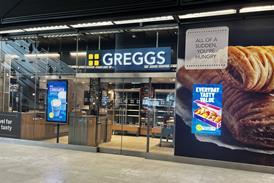
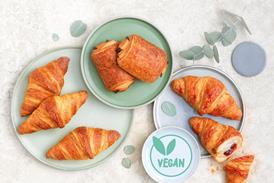
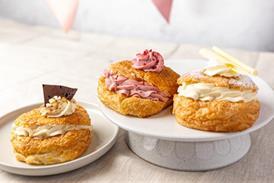


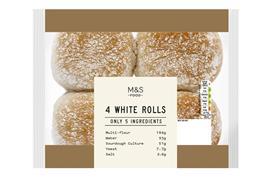
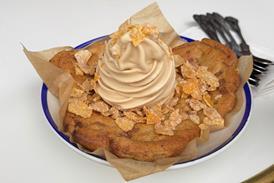


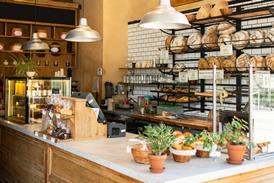





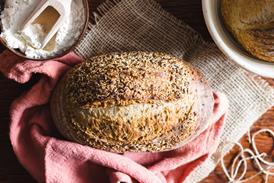
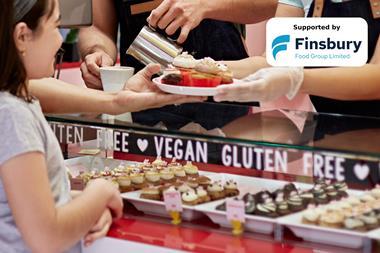


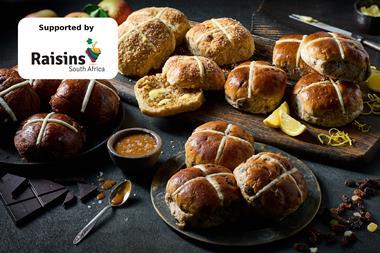

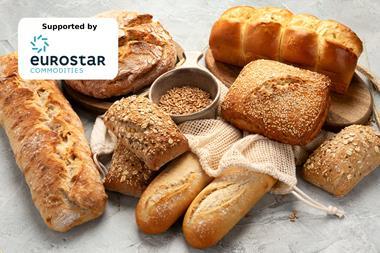





















No comments yet